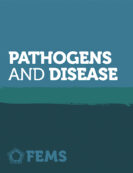Pathogens and Disease best Postdoc Talk runner-up: Stephanie Nofal
We send our congratulations to Stephanie Nofal, who is the runner-up of the best Postdoc Talk at ToxoUK. This award is sponsored by our journal Pathogens and Disease.
 ToxoUK took place on the 14th of December 2021 in Cambridge, UK. Stephanie’s winning talk was titled “A positive feedback loop mediates crosstalk between calcium, cyclic nucleotide and lipid signalling in Toxoplasma gondii“.
ToxoUK took place on the 14th of December 2021 in Cambridge, UK. Stephanie’s winning talk was titled “A positive feedback loop mediates crosstalk between calcium, cyclic nucleotide and lipid signalling in Toxoplasma gondii“.
Read our interview with Stephanie about her research below:
What is your current position, and what was your scientific journey to get there?
I am currently a postdoctoral training fellow in Moritz Treeck’s lab at the Francis Crick Institute in London. I completed my PhD at the London School of Hygiene & Tropical Medicine, where my research focused on signalling in the malaria parasite, Plasmodium falciparum. My PhD project led me to my current position working on signalling in the related parasite, Toxoplasma gondii.”
Could you describe the research your presentation covered?
Toxoplasma gondii is an apicomplexan parasite that infects a third of the world’s population. During infection, T. gondii parasites reside within our cells where they undergo several rounds of replication before exiting the cell in a highly regulated process called egress. There are several signalling pathways that are required to bring about parasite egress, and my work focuses on how the different signalling pathways interact with one another. In my talk I showed how we discovered a previously unknown feedback loop between calcium signalling and upstream pathways using a combination of proteomics, biochemical and cell biological approaches.”
What do you hope to focus your research on in the future?
I am truly fascinated by the unique and complex biology of apicomplexan parasites. In the future I would like to shift my focus back to P. falciparum, which I worked on during my PhD, to study how the transmissible stages known as gametocytes remodel their host cell to establish their niche.”
–
We use income from the FEMS Journals to fund grants, awards, and projects, and to support our knowledge sharing events and initiatives. Consider publishing your research with our journals to help the global microbiology community.
All but one of the FEMS journals are now fully open access (OA), with one journal, FEMS Microbiology Letters remaining a subscription journal with free-to-publish and OA options. Open access is key to supporting the FEMS mission of disseminating high quality research as widely as possible: when high quality, peer reviewed sound science is open access, anyone, anywhere in the world with an internet connection, can read it.







